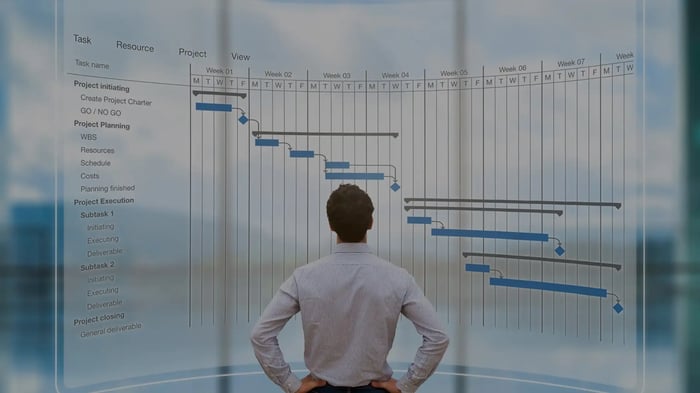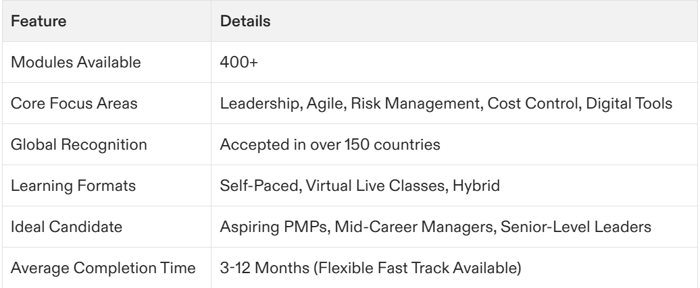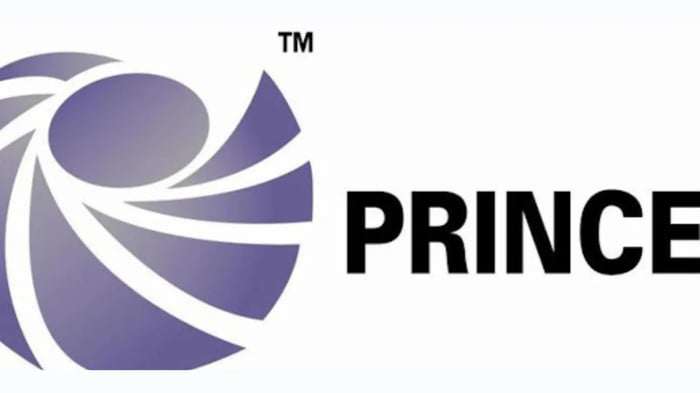Introduction To PMP Certification
In today’s fast-paced and competitive business environment, effective PMP certification is crucial for ensuring that projects are completed on time, within budget, and according to stakeholder expectations. Organizations across industries are constantly looking for skilled project managers who can handle complex projects with efficiency.
One of the best ways to demonstrate your project management expertise and stand out in the job market is by earning a Project Management Professional (PMP) certification. Recognized globally, PMP certification is the gold standard in project management, validating a professional’s ability to lead and direct projects successfully.
Whether you’re an experienced project manager looking to advance your career or someone exploring project management as a profession, this guide will provide you with everything you need to know about PMP certification, including its benefits, eligibility criteria, exam details, costs, preparation strategies, and career opportunities.
What is PMP Certification?

Definition of PMP Certification
The Project Management Professional (PMP) certification is a globally recognized credential offered by the Project Management Institute (PMI). It is designed for experienced project managers who want to validate their skills and knowledge in managing projects effectively.
The certification is based on the Project Management Body of Knowledge (PMBOK® Guide), which outlines best practices, methodologies, and principles of project management across various industries.
Who Issues the PMP Certification?
The Project Management Institute (PMI), a non-profit professional organization established in 1969, is responsible for issuing the PMP certification. PMI sets the global standard for project management practices and offers various certifications, including PMP, CAPM (Certified Associate in Project Management), and PMI-ACP (Agile Certified Practitioner).
What Does the PMP Certification Cover?
The PMP certification covers key project management concepts across three domains:
People (42%) – Focuses on leadership, team management, conflict resolution, and stakeholder engagement.
Process (50%) – Covers project planning, execution, risk management, scope, schedule, and cost control.
Business Environment (8%) – Addresses the strategic impact of projects on business objectives.
The PMP exam is not just about memorizing concepts—it tests how well you can apply real-world project management experience to different situations.
Why Get PMP Certified?
Earning PMP certification comes with numerous benefits, making it one of the most sought-after credentials in the project management field.
1. Career Growth and Advancement
Many organizations require PMP certification for senior project management roles. Having a PMP certification sets you apart from non-certified candidates and helps you qualify for better job opportunities, leadership positions, and higher salaries.
2. Increased Salary Potential
According to PMI’s Earning Power Salary Survey, PMP-certified professionals earn 25% more on average compared to those without the certification. In some industries, PMP-certified project managers make significantly higher salaries than their non-certified counterparts.
3. Global Recognition
Unlike some certifications that are region-specific, PMP is recognized worldwide. This makes it a great credential for professionals who work with international teams or want to explore job opportunities in different countries.
4. Higher Project Success Rates
Studies have shown that companies with PMP-certified project managers are more likely to deliver projects successfully—on time, within budget, and meeting business objectives. This is because PMP-certified professionals are trained in industry best practices.
5. Industry Demand Across Sectors
PMP certification is valuable across various industries, including:
IT and Software Development
Construction and Engineering
Healthcare and Pharmaceuticals
Finance and Banking
Manufacturing
Government and Defense
No matter your field, PMP certification can significantly enhance your career prospects. Earning a PMP certification can significantly boost your career, and you can explore the complete project management certification guide to get started.
PMP Certification Eligibility Requirements
Before applying for the PMP certification, you need to meet specific educational and work experience requirements. PMI has two different sets of criteria based on your highest level of education.
Option 1: If You Have a Four-Year Degree (Bachelor’s or Equivalent)
Minimum of 36 months (3 years) of project management experience
35 contact hours of formal project management training (or a CAPM certification)
Option 2: If You Have a High School Diploma or Associate Degree
Minimum of 60 months (5 years) of project management experience
35 contact hours of formal project management training
Key Points About Eligibility
You do not need to hold a formal job title of "Project Manager" to qualify, but you must have experience leading projects.
The required 35 contact hours can be obtained through PMI-approved training providers, university courses, or online programs.
How to Apply for PMP Cert*ification
Step 1: Check Your Eligibility
Before applying, ensure that you meet the education and work experience requirements mentioned above.
Step 2: Create an Account on PMI’s Website
Go to PMI.org and create an account.
Step 3: Submit Your Application
Fill out the online PMP application form, which includes details about:
Your education
Your project management experience
Your training hours
Step 4: Wait for Application Approval
PMI reviews applications within 5 business days. Some applications may be randomly selected for an audit, in which case you’ll need to submit additional documentation.
Step 5: Pay the Exam Fee
PMI Members: $405
Non-Members: $555
Step 6: Schedule Your Exam
Once your application is approved, you can schedule your PMP exam through Pearson VUE. You can take the exam either online (proctored) or in person at a test center.
If you're considering an online option, check out our detailed guide on PMP project management certification in 2025 for flexible learning solutions.
Understanding the PMP Exam
| Exam Component | Details |
|---|
| Number of Questions | 180 (Including 5 pretest questions) |
| Exam Duration | 230 Minutes (3 hours, 50 minutes) |
| Exam Format | Multiple Choice, Multiple Responses, Drag & Drop, Fill in the Blanks |
| Passing Score | Not officially disclosed by PMI |
| Breaks | Two 10-minute breaks |
| Exam Mode | Online Proctored or Test Center |
Exam Format
180 multiple-choice questions
230 minutes to complete the exam
Two scheduled 10-minute breaks
Types of Questions
Situational Questions: Testing real-world problem-solving skills
Knowledge-Based Questions: Assessing understanding of key concepts
Drag-and-Drop Questions: Matching concepts, phases, or techniques
Domains Covered in the Exam
People (42%) – Leadership, team dynamics, conflict management
Process (50%) – Risk management, scheduling, budgeting
Business Environment (8%) – Business strategy alignment
How to Prepare for the PMP Exam
1. Read the PMBOK® Guide
The Project Management Body of Knowledge (PMBOK) guide is the official reference for the exam.
2. Use PMP Exam Prep Books
Rita Mulcahy’s PMP Exam Prep
Head First PMP
3. Take PMP Training Courses
Consider PMI-approved training programs, online courses, or boot camps.
4. Practice with Mock Exams
Taking practice exams helps you identify weak areas and get comfortable with the test format.
5. Join a Study Group or Online Forum
Engaging in discussions with fellow PMP aspirants can help reinforce your learning.
Comparison of PMP Certification Online vs. Traditional Classroom Training
| Criteria | Online Training | Classroom Training |
|---|
| Flexibility | High – Self-paced learning | Fixed schedule |
| Learning Style | Video tutorials, interactive quizzes, online forums | Instructor-led, in-person discussions |
| Cost | Usually lower | Higher due to venue and instructor fees |
| Exam Preparation | Digital study materials, recorded sessions | Printed study materials, live Q&A sessions |
| Networking Opportunities | Limited | High – Face-to-face interaction with peers and instructors |
Final Thoughts
PMP certification is one of the most valuable and recognized credentials in project management. It not only enhances your career prospects and earning potential but also improves your ability to manage projects effectively.
If you’re serious about advancing in project management, take the first step by checking your eligibility, enrolling in a training program, and creating a solid study plan.
Are you ready to boost your project management career? Start your PMP journey today!
For more in-depth resources, expert insights, and the latest updates on project management certifications, visit APMIC.





